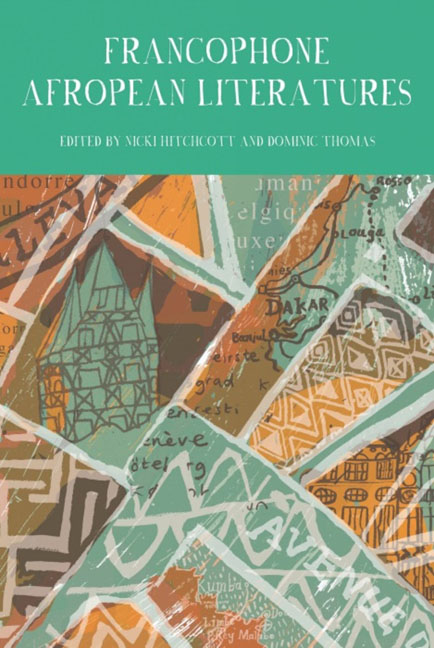Book contents
- Frontmatter
- Contents
- Introduction: Francophone Afropeans
- Essays
- Afropeanism and Francophone Sub-saharan African Writing
- The Transatlantic Poetics of Fatou Diome
- Corps Sans Titre: ‘Fleshiness’ and Afropean Identity in Bessora's 53 Cm
- Already Here: Sami Tchak's Afropean Generation
- Paris Polar: Afropean Noir in the City of Light
- Mapping Afropea: The Translation of Black Paris in the Fiction of Alain Mabanckou
- Relighting Stars and Bazaars of Voices: Exchange and Dialogue in Leonora Mianos Tels Des astres eteints and Alain Mabanckous Black Bazar
- Sex and the Afropean City: Léonora Miano's Blues Pour Élise
- Towards an Afropean Cosmopolitanism: Hospitality, Friendship and the African Immigrant
- Afropean Masculinities as bricolage
- Short Stories
- Notes on Contributors
- Index
The Transatlantic Poetics of Fatou Diome
from Essays
- Frontmatter
- Contents
- Introduction: Francophone Afropeans
- Essays
- Afropeanism and Francophone Sub-saharan African Writing
- The Transatlantic Poetics of Fatou Diome
- Corps Sans Titre: ‘Fleshiness’ and Afropean Identity in Bessora's 53 Cm
- Already Here: Sami Tchak's Afropean Generation
- Paris Polar: Afropean Noir in the City of Light
- Mapping Afropea: The Translation of Black Paris in the Fiction of Alain Mabanckou
- Relighting Stars and Bazaars of Voices: Exchange and Dialogue in Leonora Mianos Tels Des astres eteints and Alain Mabanckous Black Bazar
- Sex and the Afropean City: Léonora Miano's Blues Pour Élise
- Towards an Afropean Cosmopolitanism: Hospitality, Friendship and the African Immigrant
- Afropean Masculinities as bricolage
- Short Stories
- Notes on Contributors
- Index
Summary
Identity cards and Hemingway's melanin levels, I couldn't care less!
Fatou Diome, ‘The Old Man and the Boat’The concept of francophone Afropean literatures has emerged in recent years to account for authors shaped by Africa and Europe who publish in French, and who wrestle with what it means to be simultaneously African and European. Born in Niodior, Senegal in 1968 and a resident of Strasbourg since 1994, Fatou Diome would seem to fit well within this category. As her contribution to this volume suggests, however, Diome instead seeks to position herself as part of an even wider, more diverse literary community held together by the Atlantic. The narrator of ‘The Old Man and the Boat’ claims a transatlantic literary inheritance that includes American writer Ernest Hemingway and Brazilian modernist João Guimarães Rosa. She recognizes in Hemingway's portrayal of the Cuban fisherman Santiago in The Old Man and the Sea the dignity and generosity of spirit of her own grandfather, a fisherman on the Atlantic coast of Senegal, despite the vast linguistic and geographical distances between the two figures, and credits Guimarães Rosa's powerful evocation of the forests of Minas Gerais with allowing her to travel to South America without ever having to present a passport – an implicit critique of the international border policies that limit the mobility of Africans.
Diome's impressive literary production includes a collection of short stories, La Préférence nationale [The National Preference] (2001), the autobiographical short novella ‘The Old Man and the Boat’, included in this volume, and four novels, Le Ventre de l'Atlantique [2003; The Belly of the Atlantic, 2008], Kétala (2006), Inassouvies, nos vies [Our Unfulfilled Lives] (2008), and Celles qui attendent [The Women Left Waiting] (2010). She wields a supple, lyrical French prose infused with remarkable humour and irony, as well as echoes of proverbs and oral storytelling. Her work examines the causes and pitfalls of contemporary African migration to Europe and, more broadly, offers an incisive perspective on contemporary social and economic questions in Europe and Africa.
In this chapter, I consider how Diome resists being contained within Afropean discourses by developing an Atlantic aesthetics.
- Type
- Chapter
- Information
- Francophone Afropean Literatures , pp. 32 - 47Publisher: Liverpool University PressPrint publication year: 2014



